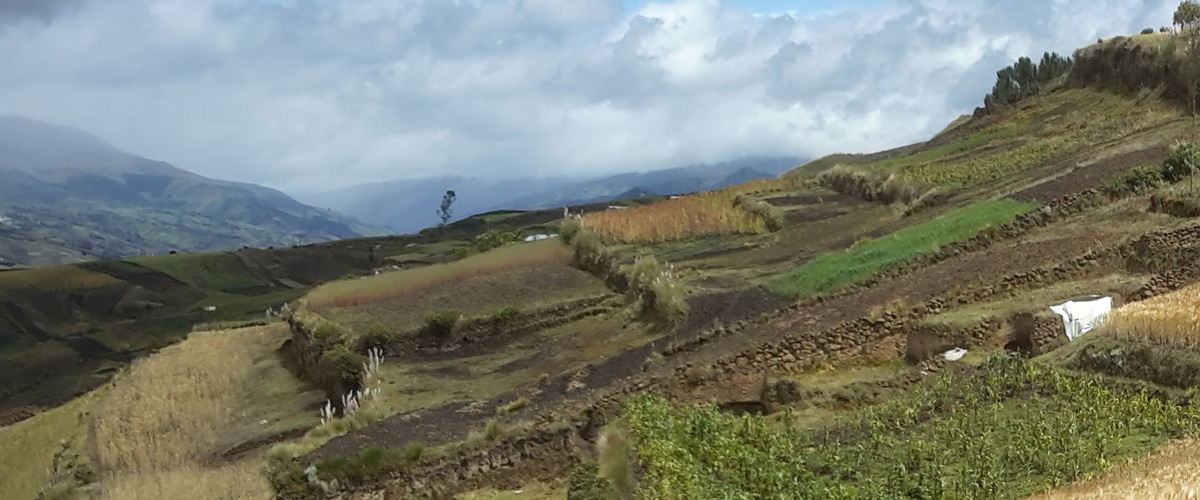
Expand Achievements and Consolidate Community of Knowledge and Practice
Lead Organization:
Latin American Council of Social Sciences (CLACSO)
Partner Organizations:
CLACSO political agroecology working group and member centers; CoP on family farming and agroecology Latin America and the Caribbean in collaboration with FAO; CoP with tutors, former scholarships, and teachers from Latin America, Europe, and US universities; SOCL; CCRP CoP members and projects; and local and regional universities
Community of Practice:
Countries:
Ecuador Bolivia Peru
Duration:
2/2022—2/2025
Overview:
Research topics focus on small-scale farmers and local communities in high-altitude (more than 2,500 meters above sea level) areas of Ecuador, Peru, and Bolivia.
Twentieth-century industrial agriculture promoted the deterioration and loss of biodiversity and is linked to the emergence of pandemics and extractivism as well as destruction of life. While agroecology’s science and practice can be found in agriculture’s very beginnings, the term in the 1970s began making political ecology visible, allied to social movements questioning the Green Revolution’s paradigm. Today, production and studies emerging from communities, in addition to gender, diversity, equity, and inclusion (DEI) approaches, enrich the formulations and make the definition more complex.
The program on Andean agroecological systems produced valuable research, the results of which have been presented publicly and are included in two CLACSO-published volumes.
CLACSO working groups have carried out research with small farmers in Brazil, Central America, and Chile as well as Bolivia and Ecuador. CLACSO launched publications and virtual seminars related to agroecology and alternative agricultural models, in some cases combining biophysical knowledge with social, cultural, and environmental. Aiming to generate greater knowledge and specific AEI experience, experts will evaluate and select grant proposals, select winners, implement training, and more.
CLACSO is pursuing alliances with other institutions and organizations that work with small farmers on agroecological principles and think of agroecology as a scientific discipline, proposing practices that combine local and global in a social movement.
Gender and DEI approaches connect to the struggles of women’s organizations of peasants, Afro, and indigenous; consumer organizations; and broader networks on food sovereignty in which experiences and knowledge are articulated. The Research and Training in Andean Agroecological Systems Program book published by CLACSO brings together the region’s political and academic agenda with the work of CLACSO working groups and allied institutions.
Grant Aims:
- Strengthen community of knowledge and practice built and consolidated over the past four years with the work of CLACSO team and advisors.
- Have decisive impact on knowledge and practice of family farming through integration of ecological principles in agricultural and food systems management, such as climate change, gender equity, buen vivir (well living), and ancestral practices.
- Create nodes of connections between research team participants with their own networks, territories, communities, and institutions to articulate with other CCRP projects.
- Develop links with regional universities in the three countries.
Outputs and Outcomes:
Outputs
- Knowledge and research deepened on agroecology, small farming, small agriculture, and integration of agroecological principles in agricultural and systems management in highlands of Ecuador, Peru, and Bolivia
- Network of knowledge and practices in agroecology strengthened as they affect the three countries and region
- Research agendas and postgraduate formation of scholarships involving advisors focused on and prioritizing regional, intercultural, and indigenous universities
- Dialogue and articulate biophysical knowledge with social, cultural, and environmental, as well as global perspectives including ancestral practices and knowledge, promoted with locals
- Impact generated on communities of small farmers where research teams work
- Local and national public policies that promote agroecological principles in agricultural management focused on small farmers with vertical and horizontal escalation principles approach
Outcomes
- Strengthened relationship between research and training to generate local impact, knowledge, and dialogue that’s not reduced to academic action only
- Scholarships assigned according to the principles of the call
- At least three experts per year attending the work of fellows: research based on principles of agroecology, working with small farmers, and achieving expected results
- Fellows formation deepened and consolidated, knowledge and experiences shared with peers, tutors, and experts participating in seminars
- One on-site meeting per year articulated with fellowship projects and training seminars: CoP created and learning made up of scholarship, tutors, and experts
- Publications and dissemination of research projects and tutors in various formats: farmers’ communities, academic, and public policies focused on per agroecological intensification (AEI) principles
- Continuity relations given and strengthened between people working on AEI or related issues